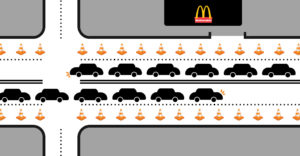I was eating breakfast at a McDonald’s when I noticed a situation developing outside. The highway department was doing construction on the street in front of the restaurant and had blocked off several lanes with orange cones.
The lane closures were congesting traffic. As cars in the right lane edged forward, they began to block the McDonald’s entrance, preventing the cars headed in the opposite direction from turning into its parking lot. Anytime cars in the left lane wanted to enter, they would have to wait on a driver in the right lane to let them across.
Unfortunately, the drivers in the right lane were not allowing cars to cross with any sort of regularity, which led the left lane to become even more backed up. The situation was growing increasingly worse because the cars backed up in the left lane were now blocking the intersection further down the street—preventing the cars in the right lane from turning left.

Because of the orange cones, nobody was able to go around the cars waiting to turn.
The situation had grown into a serious traffic jam. Drivers became impatient. They started honking their horns and hurling obscenities—both of which seemed to only exasperate the situation.
As I watched everything develop from inside the McDonald’s, I wondered how that many drivers could be so oblivious to their selfishness. Why couldn’t they see the problem? The entire situation could be resolved if those in the right lane just left an opening to allow the cars in the left lane to pull into the restaurant.
Too many of the drivers in the right lane were focused on their individual needs to realize the inconvenience they were creating for themselves and everybody else. They thought they would get ahead by remaining close to the bumper of the car in front of them but failed to consider the possibility that leaving an opening would actually make them advance faster.
The McDonald’s situation epitomizes the problems created by a lack of selfishness awareness. Selfishness leads to unnecessary drama on teams. Good teammates have the foresight to appreciate the ramification of their actions. They consciously put themselves in a position to anticipate the inconvenience their decisions could cause the other members of the team.
Awareness of how their actions impact others is a trademark of good teammates. They weigh the inconvenience of others before they their act. For example, good teammates would see the need to leave an opening and not block the McDonald’s entrance.
Apparently, I wasn’t the only one observing the volatile situation developing in front of the McDonald’s. It wasn’t long until the restaurant’s manager had an employee stand near the intersection with a sign that read “Please be kind and don’t block the entrance.” (Good teammate move by the manager!)
The sign worked. Traffic started to flow again. The manager’s response was almost perfect. The only way it could have possibly been improved were if he were to have replaced the words “please be kind” with “please be a good teammate.” But that may just be a personal preference.
As always…Good teammates care. Good teammates share. Good teammates listen. Go be a good teammate.





